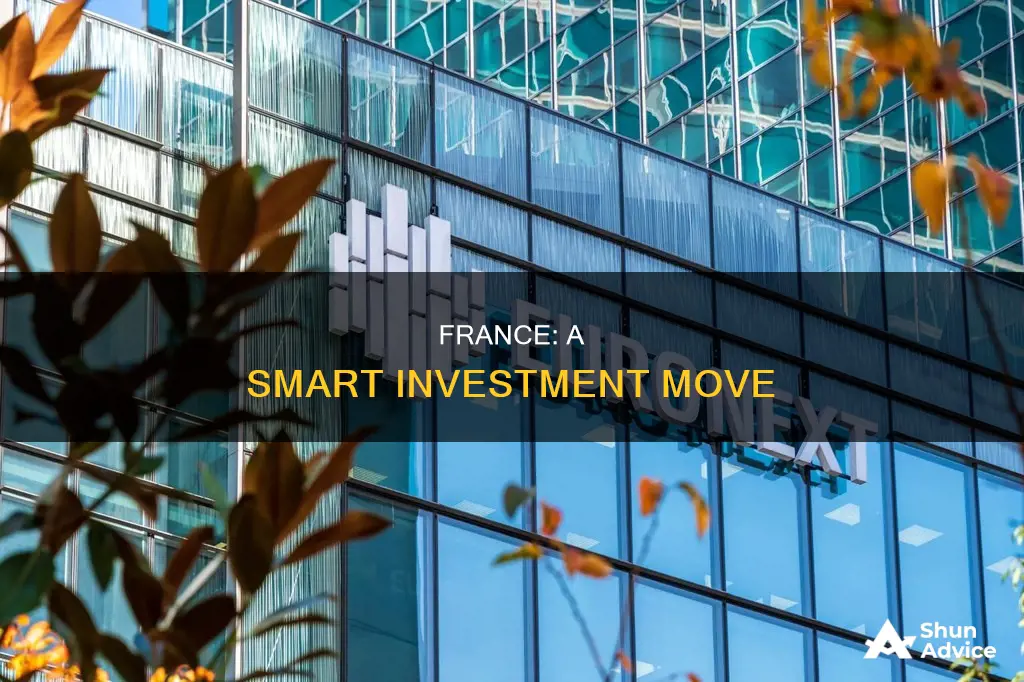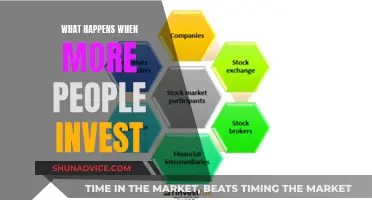
France is an attractive country for investors, with a strong market economy, a vibrant business sector, and a highly qualified and productive workforce. As the world's fifth-largest economy and the second-biggest consumer market in Europe, France offers numerous opportunities for investors. The country has a proven track record of attracting and retaining foreign companies and talent, and its strong demographics make it one of the main global economic powers.
France's position as a founding member of the European Union and Eurozone gives it direct access to the single European market and EU partners. The country also boasts exceptional infrastructure, with fast and efficient connections to the world, particularly Europe, Africa, and the Middle East. Additionally, France has a high-quality communications infrastructure, including high-speed network coverage and competitively priced electricity.
The French government is committed to innovation and entrepreneurship, investing heavily in research and development, and providing an extensive network of incubators and accelerators for innovative businesses. The country also has a strong investment culture, with around 1.5 million active stock market investors at the start of 2023.
France offers a range of investment options, including high-interest bank accounts, stocks, shares, pensions, and life insurance. The country's stable currency, the euro, is one of the most traded global currencies. France's strong economic position and favourable business environment make it an appealing choice for those looking to grow their funds and do business in Europe.
What You'll Learn

France is a global economic power
France is a major actor in global trade, ranked as the world's ninth-largest exporter and seventh-largest importer of merchandise, with trade representing 73% of its GDP. The country's main exports include aircraft, pharmaceutical products, vehicles, food products, turbines, and beauty products, while its primary imports are hydrocarbons, vehicles, pharmaceutical products, and telephones. France is also the world's second-largest agricultural exporter, accounting for almost one-fourth of the EU's total agricultural production.
In addition to its strong economic indicators, France is also a global leader in soft power, ranking first in the Soft Power 30 index in 2017. This is due to its vast diplomatic network, cultural richness, and policies on cooperation and integration. France is also a founding member of the United Nations, with a permanent seat on its Security Council, and is part of other major groups such as the European Union, World Trade Organization, and NATO.
Paris, France's financial capital, is a leading global city with one of the largest city GDPs in the world. It is ranked third worldwide by the number of companies classified in Fortune's Global 500, and its metropolitan area generates around one-third of France's GDP.
Overall, France's economic strength, diversified industries, global trade connections, and soft power influence solidify its position as a global economic power.
Movie Investors: Who Are They?
You may want to see also

France is open to foreign investors
France is a modern, open market with strong demographics and is one of the main global economic powers. As a founding member of the European Union and the Eurozone, France is at the heart of Europe, offering direct access to the single European market and EU partners. France is ranked 10th for Foreign Direct Investment (FDI) stock and, in 2018, was chosen to host 1,323 foreign investment projects, a figure that exceeded the previous year's record.
France's economic attractiveness is booming and it is ranked as the most attractive country in Europe for the fifth year running. France is also a global economic power, with a GDP of $2,762 billion at current prices in 2019, making it the world's seventh-largest economy. France is home to 29 of the world's 500 leading businesses and has strong banking, insurance, energy, and automotive industries.
France is a vibrant market in terms of net business creation and has a proven track record of attracting and retaining foreign companies and key talent. Innovative businesses can benefit from an extensive network of incubators and accelerators all over France, including Station F, the world's biggest start-up campus, which is attracting many foreign companies. France makes life easier for entrepreneurs, with an ambitious labour market and tax reform programme and an action plan to promote corporate growth and simplify the business environment.
The French government encourages foreign business investment through various initiatives, including France 2030 and La French Tech, which supports start-ups. France is investing heavily in its education system, and it has a qualified, adaptable workforce that can master new technologies, which are essential for increasing productivity. France offers strong labour productivity and, compared to the United States, for example, offers attractive operating costs for foreign companies in all sectors of activity, particularly R&D.
Investing in Ideas: Backing Brainpower
You may want to see also

France has a highly qualified and productive workforce
The French government invests heavily in its education system, allocating 5% of its GDP to education and training. This investment has resulted in a highly qualified and adaptable workforce capable of mastering new technologies, which is essential for increasing productivity. Approximately 44.7% of the population aged 25-34 and 33.5% of those aged 25-64 have a higher education qualification. France's focus on education is reflected in the fact that it ranks 2nd in Europe for the percentage of employees with scientific or technical degrees.
The French workforce is also known for its high level of training. France spends 7% of its GDP on education and training, ensuring that its workers are well-prepared for their roles. This investment in training extends beyond the initial education system, with 1.5% of the country's GDP being allocated to employee training programs and apprenticeships. This ongoing professional development fosters a workforce that is highly flexible and capable of adapting to changes in organisation and work methods throughout their careers.
The productivity of the French workforce is further enhanced by the country's competitive business environment. France has implemented measures to increase competitiveness within companies, resulting in a labour cost growth rate lower than that of its neighbouring countries. Additionally, the legislation around the 35-hour workweek has been relaxed, allowing for greater workload organisation flexibility. These factors contribute to higher performance rates in France, with productivity rates that are 20% higher than the European average.
Bankers: Bad Apples or Bad Barrel?
You may want to see also

France is a nation of entrepreneurs
The French government actively supports this entrepreneurial culture through various initiatives. The country has a strong focus on innovation, with a €10 billion fund created in 2018 to finance innovation and support start-ups. France is also committed to reindustrialisation and becoming a leader in sustainable economic transformation, as evidenced by its France 2030 investment plan, which includes €20 billion for the ecological transition.
France's business-friendly environment extends to its regulatory framework, making it easy to set up a company. The process is streamlined, taking only 3.5 days on average, compared to 4.5 days in the UK and 10.5 days in Germany. This efficiency is a significant advantage for entrepreneurs looking to establish their ventures quickly and capitalise on market opportunities.
The country's strong education system further enhances its appeal to entrepreneurs. France invests heavily in education, allocating 5% of its GDP to this sector, resulting in a highly qualified and adaptable workforce. This talented pool of human resources can master new technologies, which is essential for increasing productivity and keeping pace with technological advancements.
France's entrepreneurial landscape is diverse, with people of all ages and sectors embracing the start-up culture. Notably, young people are taking the lead, with 51% of those aged 18-30 involved in the entrepreneurial chain and 86% intending to create or take over a business. This shift towards entrepreneurship among the youth reflects their desire for independence and their ambition to pursue their dreams and face new challenges.
France's vibrant start-up ecosystem attracts foreign investment, with the country being the leading destination for foreign investment in Europe in 2023. Its strong market economy, robust financial regulations, and stable currency make it an appealing destination for investors looking to grow their funds. France's position as a global economic power, with a GDP of $2,762 billion in 2019, further enhances its attractiveness to investors.
In summary, France is a nation that fosters and celebrates entrepreneurship, offering a supportive environment for start-ups and attracting foreign investment. With its efficient business creation processes, talented workforce, and diverse entrepreneurial community, France presents a compelling opportunity for those looking to establish and grow their ventures.
Investment Advisor: Helping People Navigate Finances
You may want to see also

France is a nation of innovation
France's innovation success can be attributed to several factors. Firstly, the country has a strong foundation of academic and scientific research. The collaboration between researchers conducting basic research and the commercial sector has improved significantly, with legislative changes such as the 'Allègre law' enabling publicly funded researchers to pursue start-ups or commercial consultancies. The establishment of public-private basic research units, called mixed research laboratories, has also fostered closer relations between academia and industry.
Secondly, French innovators have become more outward-looking and international in their outlook. The inclusion of English as a compulsory language in primary schools has contributed to this shift. This change has helped French innovators expand their reach and attract global talent, investors, and entrepreneurs.
Thirdly, France has a supportive ecosystem for start-ups, with many business incubators and accelerators. A survey by the Polytechnic University of Turin in 2020 found that France had more start-up incubators and accelerators than the UK, Germany, Spain, and Italy. The country also has initiatives like "La French Tech," which supports start-ups and aims to make France one of the greatest countries to grow and launch international firms.
Additionally, the French government has implemented policies and provided funding to encourage and globalize French-based start-ups. For example, President Emmanuel Macron pledged over £1.5 billion to promote research in artificial intelligence, with a focus on mobility and healthcare. The government has also set a goal of increasing R&D spending from 2.2% of GDP to 3% by 2030, demonstrating its commitment to innovation.
Lastly, regional and local authorities in France recognize the importance of innovation for local development and economic growth. They have executed specific policies to encourage innovative start-ups, providing seed investment and guarantees. This support at the local level further enhances France's innovation ecosystem and makes it an attractive destination for investors and entrepreneurs.
In conclusion, France's innovation capabilities, supportive policies, and dynamic start-up culture make it an ideal nation for investment. The country's commitment to research, collaboration, and international outlook position it as a global leader in innovation, offering numerous opportunities for businesses and investors.
What Your Neighbors Are Investing In
You may want to see also
Frequently asked questions
France is the world's fifth-largest economy, the second-biggest consumer market in Europe, and the seventh-largest foreign investor. It has a strong, competitive economy, a skilled labour force, and a vibrant market in terms of net business creation.
France has a strong market economy and robust financial regulations. There are plenty of options to grow your funds, including high-interest bank accounts, stocks and shares, pensions, and life insurance. France is also investing heavily in its education system, which means it has a highly qualified, adaptable workforce that can master new technologies.
France has a strong investment culture. There were around 1.5 million active stock market investors in the country at the start of 2023. France is a member of Euronext, the third-biggest stock market in the world, with a market cap of $7.2 trillion. Investment through savings is also common. France has a gross savings rate of 23% of GDP, just below the global and European Union (EU) averages.







